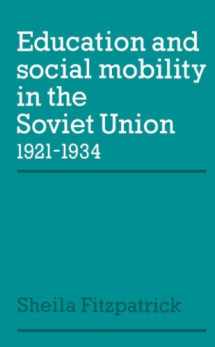
Education and Social Mobility in the Soviet Union 1921–1934 (Cambridge Russian, Soviet and Post-Soviet Studies, Series Number 27)
Book details
Summary
Description
This is a history of Soviet education policy 1921-34 that places special emphasis upon the theme of social mobility through education. One of the hitherto untold stories of Soviet history is the making of the 'Brezhnev generation', a cohort of young workers and Communists sent to higher education during the First Five-Year Plan (1928-1932) and subsequently catapulted into leadership positions in the wake of the Great Purge of 1937/38. A focal point of this book is the educational policies which not only produced the 'Brezhnev generation', but also linked Stalin's regime with the massive upward mobility of the industrializing 1930s. The book is the first comprehensive history of Soviet education in the 1920s and early 1930s, and provides a sequel to the author's highly praised Commissariat of Enlightenment. In this, as in the earlier study, the author has used Soviet archival sources not previously available to Western scholars.


We would LOVE it if you could help us and other readers by reviewing the book
Book review



